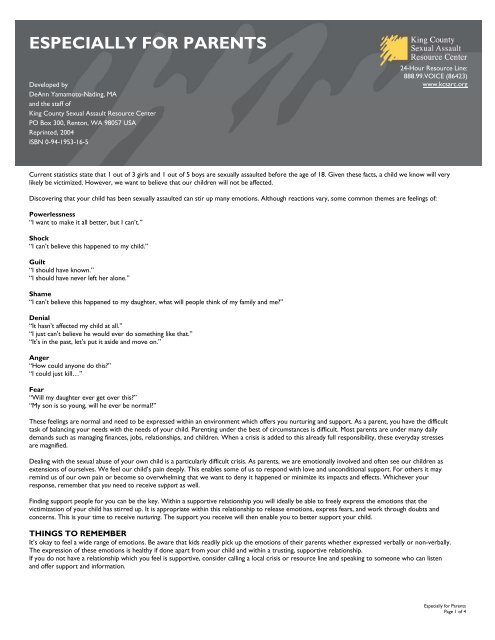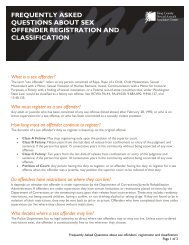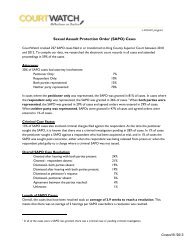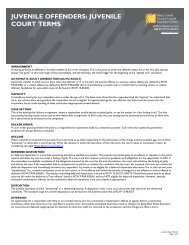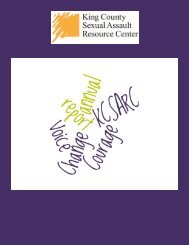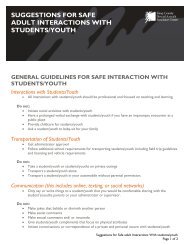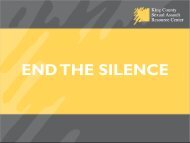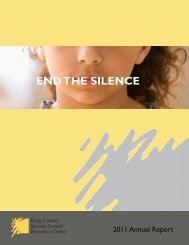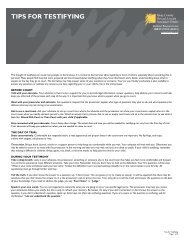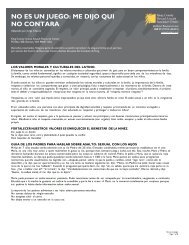especially for parents - King County Sexual Assault Resource Center
especially for parents - King County Sexual Assault Resource Center
especially for parents - King County Sexual Assault Resource Center
Create successful ePaper yourself
Turn your PDF publications into a flip-book with our unique Google optimized e-Paper software.
Continue to reassure your child that you are glad s/he told about the abuse and that you believe her/him. Tell your child directly that what happenedwas not her/his fault. Remember that the responsibility lies solely with the offender.Listen to your child when s/he expresses feelings. Give her/him ‘permission’ to freely express these emotions. Allowing this freedom validates the childand gives her/him the message that it is okay to talk about these feelings.Allow your child to ask questions. This can be a very confusing time. S/he is probably being asked many questions without knowing the reason <strong>for</strong>them. Answer questions with a calm, reassuring voice and in simple language.Do not pressure your child to talk. Sometimes the most nurturing thing <strong>for</strong> a <strong>parents</strong> to do is to simple be available to listen when your child needsyou.SOME COMMON QUESTIONS FROM PARENTSThis time can also be confusing <strong>for</strong> <strong>parents</strong>. It is common <strong>for</strong> <strong>parents</strong> to be flooded with questions as they try to do what is best <strong>for</strong> their children.Why didn’t my child tell me sooner?Children do not always know exactly what is happening to them when they are being sexually abused. Abusers most often gain the trust of their victimbe<strong>for</strong>e they actually abuse them. Children may feel that something is not quite right or that they feel ‘funny’ about certain behaviors but they may notbe at an age where they can identify the problem directly. They may not have the vocabulary to tell exactly what happened.Children often “tell” about being sexually abused without knowing specific words. Sometimes kids tell about abuse through changes in their behavior.Many kids cannot explain what is happening to them, but they can ‘show’ through their behavior that something is wrong. They may act out, becomeaggressive, become passive, change their eating patterns, regress to behaviors of an earlier age, etc. These are all ways that kids tell adults to payattention.Should I treat my child differently now?Children need to be treated with sensitivity under any circumstances. A child who has been sexually abused may need more reassurance of your loveand support than usual.Continuing to follow regular household routines are usually best. Children often find com<strong>for</strong>t in the predictability that a routine offers.How should I discipline my child?Some children who have been sexually abused may act out behaviorally. Developmentally, children may not have the ability to talk about what they arefeeling inside. Often children feel emotions physically. Acting out, then, is their way of releasing the physical presence of very new emotions.Although children need to express their emotions, they also need to learn to do it in acceptable and appropriate ways. Sometimes acknowledging theirprimary emotions such as fear, sadness, or frustration is an appropriate response to their behavior. If, however, acknowledging these feelings does notstop the child’s acting out behavior, s/he may need more concrete teaching about appropriate responses.Teaching alternative behaviors may include disciplining your child <strong>for</strong> the inappropriate acting out. The discipline should be fair, consistent, and planned.Parents must weigh whether this action is teaching the child what is inappropriate about the behavior or a parental reaction out of frustration with thechild or the behavior. If discipline has been loose, unstructured or inconsistent in the past, it is important to build in more predictability at this point.Teach your child what s/he can expect under which circumstances. This kind of structure and predictability will allow your child to know the limits andconsequences. This, in turn, gives them a sense of control.Ideally, discipline should empower children because it teaches them proper boundaries and acceptable behaviors. Discipline which is done out of angertakes away power and teaches children to fear their environment.Who should know about what has happened?With younger children, <strong>parents</strong> can make the judgment about who to tell based on determining who will ultimately benefit the child. If the child isschool-aged, it is often times beneficial <strong>for</strong> a teacher to know about the sexual abuse, because they can provide support to your child in the schoolenvironment. Also, if the sexual abuse has impacted your child in such a way that it will influence or affect others (<strong>for</strong> example, aggressive behaviortoward peers, mood swings, etc.), those who are caretakers of your child should be in<strong>for</strong>med. The in<strong>for</strong>mation should not be too detailed but beenough <strong>for</strong> them to play how they might respond to these behaviors.It is also important to consider how the other party will receive this in<strong>for</strong>mation. If you believe they do not have the skills to appropriately deal withthe in<strong>for</strong>mation, it may be wiser not to tell.For older children, it is important to consider how they feel about certain people knowing. Engage them in conversation about this and make decisionswith their feelings in mind.What happens in therapy?The goals of therapy <strong>for</strong> children are to provide a safe, non-threatening environment <strong>for</strong> them to sort through their thoughts and feelings about thesexual abuse and to receive relevant in<strong>for</strong>mation and teaching. The methods used to achieve these goals are tailored to the age and developmentalstage of each child.Especially <strong>for</strong> ParentsPage 3 of 4
How do I know if my child needs therapy?Most children who display behavioral or emotional changes can benefit from therapy of some sort. The type and length of treatment is based on everychild’s differing needs. However, all children benefit from immediate love, nurturing, and support from significant people in their lives. Sometimes youcan have the greatest impact on the child.Most children who have been sexually assaulted will benefit from therapy at some point in their life. The effects of the abuse may impact themdifferently at various stages in their development. This is a normal process of healing. What is significant to a child at age eight will be different whenthey turn sixteen. Different developmental states bring new concerns to the surface.For additional copies contact:<strong>King</strong> <strong>County</strong> <strong>Sexual</strong> <strong>Assault</strong> <strong>Resource</strong> <strong>Center</strong>P.O. Box 300, Renton, WA 98057Tel: 425.226.5062Fax: 425.235.7422Business Line (Voice/TTY)www.kcsarc.org24-hour <strong>Sexual</strong> <strong>Assault</strong> <strong>Resource</strong> Line888.99.VOICEToll-free in Western Washington onlyKCSARC is registered under the Washington state Charitable Solicitation Act (Chapter 19.09 FCW). In<strong>for</strong>mation relating to our financial affairs isavailable by contacting our office or the office of the Secretary of State.Accredited by: Office of Crime Victims’ AdvocacyEspecially <strong>for</strong> ParentsPage 4 of 4


